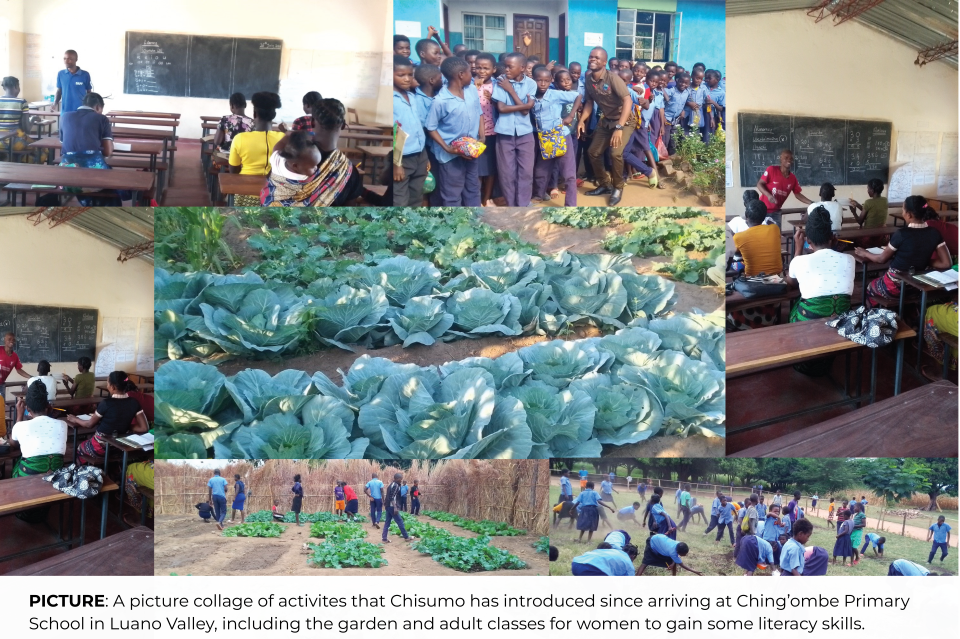“…seeing the pride of mother reading a full sentence for her first time, reminded me why teaching every child, especially those in rural areas really matters,” says Chisumo
Retention of teachers in rural areas often faces challenges, with many new teachers flooding education board offices in rural districts in an attempt to get transfers to urban areas, and sometimes—others do not even report to their rural posts, leaving that rural child without an educator.

As the global community continues celebrating the teacher’s contribution towards building a resilient and sustainable society, Sidney Chisumo stands as a beacon of hope for education in rural areas. He teaches at Ching’ombe Primary School in the Luano Valley—over 200 kilometres from Mkushi town in Central province.
“When I was first deployed here in 2021, I faced the usual challenges like any other rural teacher such as the desire for improved social amenities, inadequate infrastructure and harsh weather conditions. For example, the valley is usually cut off from the rest of the district during the rainy season. Sometimes, the only way to reach us is by plane,” explained Chisumo.
However, these challenges cannot match Chisumo’s commitment to live and serve in rural areas. He is not only contributing towards improving learning among his pupils in Grade 3 class but also that of their parents.
“It takes both the parents and the teacher to educate a child. But it is difficult for parents to help their children, or take an interest at all if they are not able to read or write. That is why I started an evening adult literacy class for parents to acquire basic literacy skills. One of my learners, brought her mother to the class, and seeing the pride of a mother reading a full sentence for the first time, reminded me why teaching every child, especially those in rural areas really matters,” he explained.
Chisumo did his training at DAPP Mkushi College of Education, a teacher training institution with a deliberate approach to preparing teachers for rural schools. The attributes his attitude towards teaching his training
“…the college equipped me with skills and experiences that help me to embrace any environment I am deployed to serve, especially in rural areas. I acquired both theory and practical, hands-on skills such as agriculture to overcome challenges. I also learnt about community engagement at college. I believe that when parents embrace education, it becomes easier to teach children and discourage vices such as early marriages in communities,” narrated Chisumo.
He added; “…since coming here, I have started a school garden using sustainable agriculture. This has caught the attention of parents—who are mostly farmers, and now they visit to learn how to grow crops using manure instead of chemical fertilizers. Even when I don’t have teaching aids, I always rely on tools in my natural environment that help my pupils to connect what they learn with reality.”
Meanwhile, Luano District Education Board Secretary (DEBS), Victor Simufwi acknowledges the need to prepare teachers in college with skills and experiences to adapt in rural areas.
"…I do not have problems with teachers from DAPP College bothering my office with requests for transfers, thanks to their mental preparation to serve in challenging environments. They are unique. As you have seen outside my office, there is already a queue and most of these are appointments for requests for transfers,” stated Simufwi.
He added; "...my office has also benefitted from the college's policy that mandates teachers to do their teaching experience in rural areas. They help to close the gap where there are few teachers. They work alongside the community, introducing programs like adult literacy, sustainable agriculture, building and metal fabrication, that have a lasting impact. They don’t just teach—they build connections, strengthen community resilience, and reignite hope for our learners in rural areas,” he emphasized.
The college, established in 2012 under the theme “training another kind of a teacher, has graduated over 370 students—the majority of whom have been deployed in rural areas. Chisumo is among the over 30 thousand teachers deployed by the government, mostly in rural areas in 2021.


